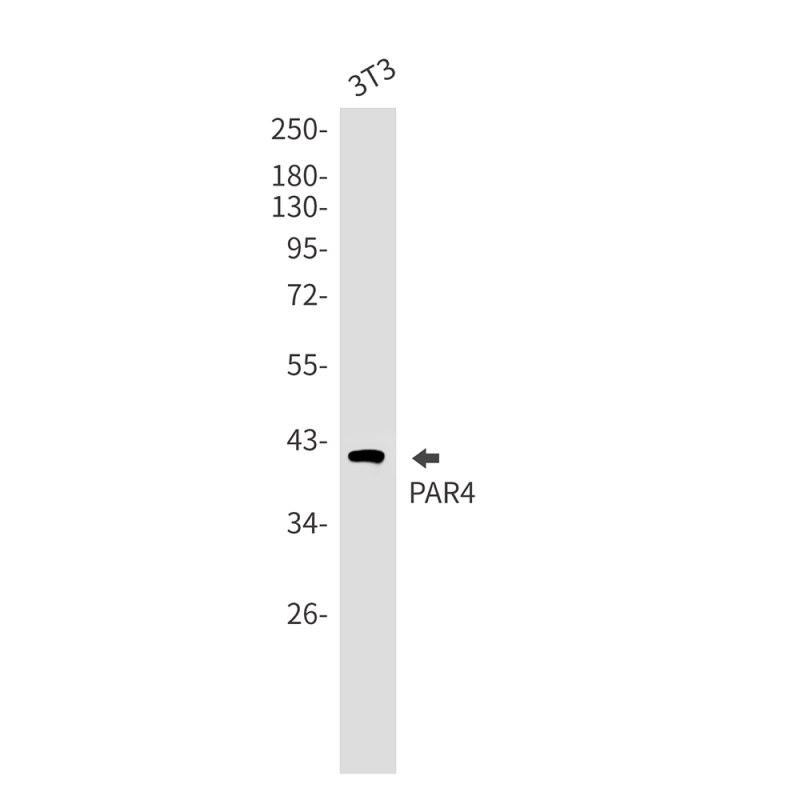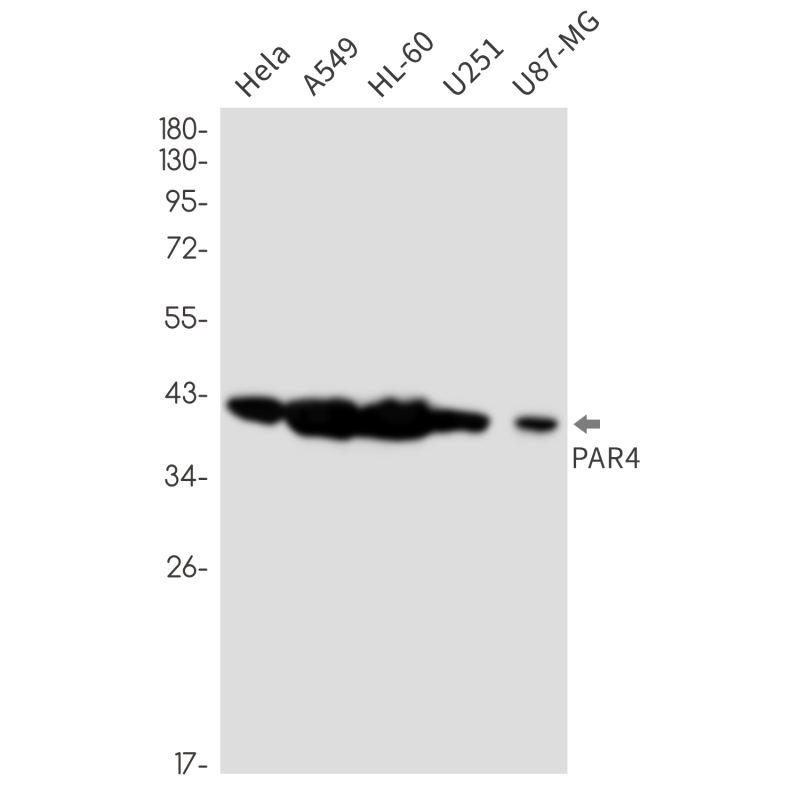

| WB | 1/500-1/1000 | Human,Mouse,Rat |
| IF | 1/20 | Human,Mouse,Rat |
| IHC | 咨询技术 | Human,Mouse,Rat |
| ICC | 技术咨询 | Human,Mouse,Rat |
| FCM | 咨询技术 | Human,Mouse,Rat |
| Elisa | 咨询技术 | Human,Mouse,Rat |
| Aliases | PAWR; PAR4; PRKC apoptosis WT1 regulator protein; Prostate apoptosis response 4 protein; Par-4 |
| Entrez GeneID | 5074 |
| WB Predicted band size | Calculated MW: 37 kDa; Observed MW: 41 kDa |
| Host/Isotype | Rabbit IgG |
| Antibody Type | Primary antibody |
| Storage | Store at 4°C short term. Aliquot and store at -20°C long term. Avoid freeze/thaw cycles. |
| Species Reactivity | Human,Mouse |
| Immunogen | A synthetic peptide of human PAR4 |
| Formulation | Purified antibody in TBS with 0.05% sodium azide,0.05%BSA and 50% glycerol. |
+ +
以下是3-4条关于 **PAR4(Protease-Activated Receptor 4)抗体** 的参考文献及简要内容概括:
---
1. **文献名称**:*"A novel anti-PAR4 antibody reveals distinct roles of PAR4 in platelet activation and tumor progression"*
**作者**:Noor J. et al.
**摘要**:本研究开发了一种特异性靶向PAR4的单克隆抗体,验证了其在抑制血小板聚集中的作用,同时发现PAR4在肿瘤微环境中通过调控炎症信号促进癌症转移,为抗血栓和抗癌治疗提供了新靶点。
---
2. **文献名称**:*"Structural basis of PAR4 activation by thrombin and its inhibition by antibodies"*
**作者**:Zhang Y. et al.
**摘要**:通过冷冻电镜解析PAR4与凝血酶及抑制性抗体的复合物结构,揭示了PAR4的激活机制和抗体结合表位,为设计靶向PAR4的精准治疗药物提供了结构基础。
---
3. **文献名称**:*"Targeting PAR4 with a dual antibody strategy reduces thrombosis without increasing bleeding risk"*
**作者**:Chen L. et al.
**摘要**:报道了一种双抗体联合疗法(同时靶向PAR1和PAR4),在小鼠模型中显著降低动脉血栓形成风险,且未增加出血倾向,为抗血小板治疗提供了新思路。
---
4. **文献名称**:*"PAR4 expression in pancreatic cancer correlates with aggressive phenotypes and antibody blockade inhibits tumor growth"*
**作者**:Smith R. et al.
**摘要**:研究发现PAR4在胰腺癌细胞中高表达,并通过抗体阻断实验证明抑制PAR4可减少肿瘤增殖和侵袭,提示PAR4可能作为胰腺癌治疗的潜在靶标。
---
以上文献均聚焦于PAR4抗体的开发、机制研究及临床应用,涵盖抗血栓、抗癌和结构生物学领域。如需具体文献来源,建议通过PubMed或Google Scholar检索标题或作者获取全文。
PAR4 (Protease-Activated Receptor 4) is a G protein-coupled receptor activated by proteolytic cleavage, primarily by thrombin and other serine proteases. It plays a critical role in platelet activation, inflammation, and cellular responses to injury. Unlike PAR1. PAR4 exhibits slower activation kinetics and sustained signaling, contributing to prolonged thrombotic and inflammatory processes. PAR4 is expressed in platelets, endothelial cells, and various tissues, making it a target for studying thrombosis, hemostasis, and cancer metastasis.
PAR4 antibodies are tools used to detect, quantify, or modulate PAR4 activity in research and therapeutic contexts. They help elucidate PAR4’s structure-function relationships, ligand interactions, and downstream signaling pathways. In thrombosis research, PAR4 inhibitors (including blocking antibodies) are explored for their potential to prevent pathological clotting while preserving hemostasis, offering a safer alternative to conventional antiplatelet drugs. PAR4’s role in cancer progression, particularly in tumor cell invasion and angiogenesis, has also driven interest in antibody-based therapies.
Species specificity is a challenge, as PAR4 sequences vary between humans and rodents, affecting antibody cross-reactivity. Recent studies highlight PAR4’s dual role in pro- and anti-inflammatory responses, complicating therapeutic targeting. Despite these hurdles, PAR4 antibodies remain vital for diagnostics and drug development, with ongoing clinical trials evaluating their efficacy in cardiovascular and oncological diseases.
×